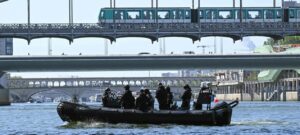The city is rehearsing for the opening parade, which will take place not in a stadium, but in the heart of the city. Hundreds of thousands of spectators are expected, making it crucial to conduct thorough testing and preparations.
The parade rehearsal takes place on a July day, with dozens of boats passing under the Iena Bridge near the Eiffel Tower. However, there are no passengers on board. This large-scale test aims to determine the duration of the boat procession from start to finish and prepare for potential incidents such as engine failures, medical emergencies, or violent incidents along the riverbank.
During the opening ceremony of the 2024 Summer Olympics, 10,000 athletes will ride down the Seine River spread across 91 boats. Tony Estanguet, former canoeist and current head of the Olympic Games Organizing Committee, jumps out of a black speedboat at the foot of the bridge. He assures that he and his team are prepared for emergencies, emphasizing that the six-kilometer route has been divided into different security zones.
Estanguet emphasizes that “security is of utmost priority” because they understand that any incident can overshadow even the most spectacular opening ceremony. On the evening of the opening ceremony, 35,000 police officers will be deployed in Paris. The city has installed 400 additional cameras equipped with artificial intelligence for real-time video surveillance to identify suspicious individuals. This marks a premiere in Europe.
A total of 40 boats with security forces will accompany the boat procession on the Seine. Paris Police Prefect Laurent Nunez observes the rehearsal parade, as the collaboration between different special units, including counter-terrorism and special forces in addition to regular police, is unprecedented. Nunez concludes that the initial test of their collaboration has been “quite positive.”
Reflecting on the unique concept of a partially open-air opening ceremony in the heart of Paris, Interior Minister Gerald Darmanin sarcastically commented during a high-level security meeting in January that the occurrence of the Olympic Games in Paris only happens once every 100 years, and an opening ceremony outside a stadium has never happened in the past 3,500 years.
Despite past terrorist attacks, recent unrest, and the chaotic experience during the 2022 Champions League Final, the city is determined to prove that the dream of an opening ceremony on the Seine can become a reality. There is no Plan B. To ensure success, in addition to state security forces, the city will require the assistance of 22,000 private security personnel, according to the Ministry of Interior. However, other estimates place the number significantly higher. Recruitment efforts for training courses are ongoing, but the number of applicants is currently insufficient. Private security schools like the EESP in Versailles provide crash courses to train candidates within three weeks.
During their training, teacher Brahim Koulibali impresses upon his mostly inexperienced students the importance of identifying suspicious individuals. They must observe and study people’s behavior, learn to interpret non-verbal language, and most importantly, report any doubts to a police officer so that appropriate action can be taken.
As Pauline, Lea, and Antoine, aged between 17 and 23, participate in the exercises, they practice for real-life scenarios. While they are young for such a responsible job, they are highly motivated. However, they also acknowledge the challenges ahead, with Lea mentioning that experiencing a simulated push during training is one thing, but the reality will undoubtedly be more intense.


